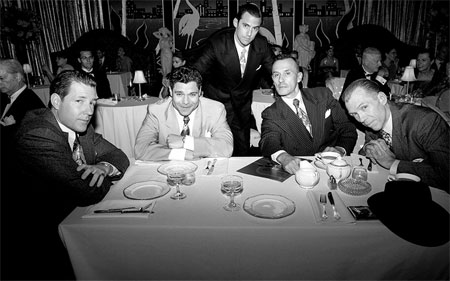A Made Man
by Natasha Wolff | December 3, 2013 1:29 pm
Not all Hollywood monsters are dreamed up for the big screen. Many of the gangsters and crooked cops on Mob City—TV god Frank Darabont’s new series[1] debuting December 4 on the TNT network—were flesh-and-blood bad guys in 1940s Los Angeles, including notable nogoodniks Bugsy Siegel, Meyer Lansky and Mickey Cohen.
Cohen, the Brooklyn-born nightclub owner and card shark who is said to have sold more newspapers in his day than anyone else in the country, is a particularly fascinating fiend. Here he’s played by Jeremy Luke, the Don Jon star whose own New York brogue and brooding good looks lend his Cohen a dangerous bit of charm. DuJour caught up with Luke to discuss Cohen, crime bosses and the importance of a good suit.

The cast of “Mob City”
This is your first TV series. How did you end up playing Mickey?
I auditioned like everybody else. A buddy of mine, Larry, helped me with the audition. He made me buy a suit and get this haircut I thought was terrible, but looked a bit 1940s. I went in on a Tuesday and later on, when I had just gotten out of work and had a few beers, my manager called and said, “Frank Darabont saw your tape and he’s flipping out. You’ve gotta memorize six pages of dialogue for tomorrow!” It wasn’t official until 10 days later, but then I lost my shit. Not only did I get my first series, but it was with my favorite person in television.
This is Darabont’s first series post-The Walking Dead, so people will be paying attention. What’s he like to work with?
Out of all the directors I’ve ever worked for, I trust him to the most. The first day was the toughest day for me because I was a bit insecure—what if he doesn’t like me? Everything was great, but in my head I was thinking, holy shit, he’s going to fire me. At the end of the day he came over to me and said, “I wanna talk to you.” He pulled me off to the side, pointed his finger in my face and said, “Now I know I got the right fucking guy.” It was like a thousand pounds of weight off my shoulders.
Mickey Cohen’s life was very public. Did you go all out with the research or try to keep from knowing too much?
I started by reading L.A. Noir and then I read Celebrity Gangster. I read books and watched biographies on Mickey and Bugsy and Meyer. I was listening to a lot of 1940s music. I didn’t go in for period talk, I thought what I was doing was enough. Frank gave us the license to just go for it. Some of the characters in the show are fictional, so he told us to go forward and have fun with the characters. The thing with Mickey was that he was a badass guy but he really did like people, he liked having his picture taken. That’s what I did differently.
He’s an interesting guy: he grew up in Brooklyn, he ran card games in Chicago, he did time in Alcatraz.
The guy was everywhere! The best thing I came across was about his suit collection: He had 300 suits in his house, but his house got blown up. He wasn’t mad about the house, but was furious about losing the suits. That’s the thing that pissed him off.
What is it about this time period that’s appealing to viewers now?
As I’ve watched the pilot and a few of the episodes, the thing I find most interesting is that they didn’t have all of the technology we have—crimes were going on without cell phones or computers. That fascinated me.
There’s a scene in the pilot where two guys shoot up a restaurant and all I could think was, aren’t there security cameras?
Today, somebody would have pulled out a phone and recorded it. The way people got away with crime back in those days—even how corrupt the police department was—would be impossible now.
This sort of wise guy character seems hard to get away from for you.
I did a movie called Don Jon, playing a very comical character. He was more of a Jersey Shore kind of goofball. Then I did [Clint Eastwood’s upcoming] Jersey Boys, playing a character similar to Mickey Cohen, but a lower level kind of guy, not a boss.
So what would a dream role be for you?
I’m doing it on Mob City.
- new series: http://www.tntdrama.com/series/mob-city/
Source URL: https://dujour.com/culture/jeremy-luke-mob-city-interview/